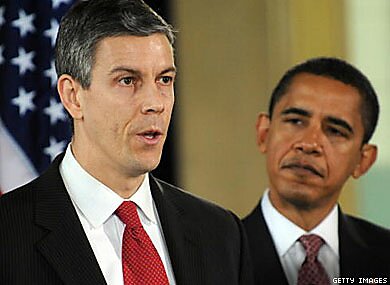Federal Study Supports School Vouchers
Last week, a U.S. Department of Education study revealed that students participating in a Washington D.C. voucher pilot program outperformed peers attending public schools.
According to The Washington Post, the study found that “students who used the vouchers received reading scores that placed them nearly four months ahead of peers who remained in public school.” In a statement, education secretary Arne Duncan said that the Obama administration “does not want to pull participating students out of the program but does not support its continuation.”
Why then did the Obama administration “let Congress slash the jugular of DC’s school voucher program despite almost certainly having an evaluation in hand showing that students in the program did better than those who tried to get vouchers and failed?”
The answer, says Cato scholar Neal McCluskey, lies in special interests and an unwillingness to embrace change after decades of maintaining the status quo:
It is not just the awesome political power of special interests, however, that keeps the monopoly in place. As Terry Moe has found, many Americans have a deep, emotional attachment to public schooling, one likely rooted in a conviction that public schooling is essential to American unity and success. It is an inaccurate conviction — public schooling is all-too-often divisive where homogeneity does not already exist, and Americans successfully educated themselves long before “public schooling” became widespread or mandatory — but the conviction nonetheless is there. Indeed, most people acknowledge that public schooling is broken, but feel they still must love it.
Susan L. Aud and Leon Michos found the program saved the city nearly $8 million in education costs in a 2006 Cato study that examined the fiscal impact of the voucher program.
To learn more about the positive effect of school choice on poor communities around the world, join the Cato Institute on April 15 to discuss James Tooley’s new book, The Beautiful Tree: A Personal Journey Into How the World’s Poorest People Are Educating Themselves.
Obama Announces New Direction on Immigration
The New York Times reports, “President Obama plans to begin addressing the country’s immigration system this year, including looking for a path for illegal immigrants to become legal, a senior administration official said on Wednesday.”
In the immigration chapter of the Cato Handbook for Policymakers, Cato trade analyst Daniel T. Griswold offered suggestions on immigration policy, which include:
- Expanding current legal immigration quotas, especially for employment-based visas.
- Creating a temporary worker program for lower-skilled workers to meet long-term labor demand and reduce incentives for illegal immigration.
- Refocusing border-control resources to keep criminals and terrorists out of the country.
In a 2002 Cato Policy Analysis, Griswold made the case for allowing Mexican laborers into the United States to work.
For more on the argument for open borders, watch Jason L. Riley of The Wall Street Journal editorial board speak about his book, Let Them In: The Case for Open Borders.
In Case You Couldn’t Join Us
Cato hosted a number of fascinating guests recently to speak about new books, reports and projects.
- Salon writer Glenn Greenwald discussed a new Cato study that exa
mines the successful drug decriminalization program in Portugal.
- Patri Friedman of the Seasteading Institute explained his project to build self-sufficient deep-sea platforms that would empower individuals to break free of national governments and start their own societies on the ocean.
- Dambisa Moyo, author of the book Dead Aid, spoke about her research that shows how government-to-government aid fails. She proposed an “aid-free solution” to development, based on the experience of successful African countries.
Find full-length videos to all Cato events on Cato’s events archive page.
Also, don’t miss Friday’s Cato Daily Podcast with legal policy analyst David Rittgers on Obama’s surge strategy in Afghanistan.


